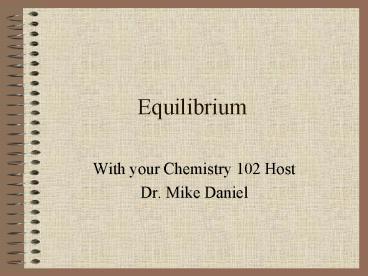Equilibrium PowerPoint PPT Presentation
1 / 33
Title: Equilibrium
1
Equilibrium
- With your Chemistry 102 Host
- Dr. Mike Daniel
2
Equilibrium
- aA bB ? cC dD
- _at_ Equilibrium Rate Forward Rate Backward
- H2O(L) ? H2O(G) Phase Equilibrium
- PH2O constant (Vapor Pressure)
3
Equilibrium Simulation
- Simulated Equilibrium
- R Y ? B G
- Red Yellow ? Blue Green
- Simulation shows dynamic equilibrium, reaction
going both directions - After a period of time, concentrations constant
4
Equilibrium
- aA bB ? cC dD
- Mass Action Expression for Homogeneous Rxn
- Q Cc Dd / AaBb
- Q Reaction Quotient
5
Equilibrium
- aA bB ? cC dD
- Mass Action Expression
- Q Cc Dd / AaBb
- _at_ Equilibrium Qc Kc Equilibrium Constant
6
Equilibrium
- aA bB ? cC dD
- Mass Action Expression for Partial Pressures
- Qp PDd PCc / PAa PBb
- _at_ Equilibrium Qp Kp Equilibrium Constant
7
Kp and Kc Relationship
- Kp Kc (RT)?ng
- ?ng moles product gas - moles reactant
- Gas
- R.0821 L atm/K mol (assuming P in atm)
8
Rxn Quotient and Equilibrium Constant
- H2I2 ? 2 HI Kc 49.5 _at_ 440.C
- If H2 I2 .05 M
- HI .2
- Q ?
- Reaction proceed to left or right?
9
Compare Equilibrium Constants
- N2 O2 ? 2 NO
- Kc NO2 / N2 O2 4.8 X 10-31 (25 C)
- Equilibrium Mixture lies far to _________
- 2H2 O2 ? 2 H2O
- Kc 9.1 X 1080 (25 C)
- Equilibrium Mixture lies far to _________
10
Thermodynamic Kp,c
- ?G ?Go RT LN (Q)
- ?G Gibbs Free Energy difference between
equilibrium and Q concentrations - ?Go ?Gfo(products) - ?Gfo(reactants)
- R 8.314 X 10-3 kJ /K mol
- ?G lt 0, Rxn proceeds toward Products
- (Similar to Q lt K)
11
Thermodynamic Kp,c
- _at_ Equilibrium ?G 0 So
- ?Go - RT LN (K)
- K Kp Gas Phase Rxn (atm)
- K Kc Solution Phase (M)
12
Thermodynamic Kp,c
- ?Go - RT LN (K)
- Measure K to calculate ?Go
- If ?Go known, calculate K
- Estimate ?GoT ? ?Ho25C - T ?So25C to estimate K
_at_ T
13
Thermodynamic Kp,c
- ?Go - RT LN (K)
- N2 O2 ? 2 NO
- Kc Kp 4.8 X 10-31 (25 C)
- ?Ho 180.8 kJ , ?So 24.7 J/K
- ?Go2400 K ? ?
- Kp ? ? (2400 K)
14
Le Chateliers Principle
- If an outside influence upsets an ?, the system
changes to counteract the disturbance , if
possible, return the system to ?. - Used to predict how ? shifts
15
Le Chateliers Principle
- Look _at_
- A
- V
- T
- Catalysts
- Inert Gas
16
Le Chateliers Principle A
_at_ Equilibrium After N2O4
17
Le Chateliers Principle A
- Adding or removing Reactants or Products
- N2O4 ? 2 NO2
- _at_ ?
- Rate forward Rf kf N2O4 RbkbNO22
- Say increase PN2O4 to .500 atm
- How will rate forward/backward change?
18
Le Chateliers Principle A
- Adding or removing Reactants or Products
- N2O4 ? 2 NO2
- Kp .140 (.212 atm)2 / .321
- Increase PN2O4 to .500 atm
- Q (.212 atm)2 / .5 0.090 lt Kp
- How does system respond?
19
Le Chateliers Principle (Vg)
- Changing V (for gas phase only)
- Decrease V is equivalent to increasing P,
- P n RT
- V
- N2 3 H2 ? 2 NH3
- 4 mole reactant gas ? 2 moles product gas
- System reduces P by shifting ?
20
Le Chateliers Principle (T)
- N2 3 H2 ? 2 NH3 ?Ho25C -92 kJ
- N2 3 H2 ? 2 NH3 92 kJ
- Increasing T makes more energy available
- System can reduce disturbance by consuming
energy, by shifting in endothermic direction - T only disturbance that changes K
21
Le Chateliers Principle (T)
- N2 3 H2 ? 2 NH3 92 kJ
- Increasing T shifts rxn backwards
- ?Go25 C -33.4 kJ
- Kp 7.2 X 105
- ?Go500 C 61.3 kJ
- Kp 7.2 X 10-5
22
Le Chateliers Principle (add catalysts)
- Catalysts lower Ea for forward and back rxn
- Speeds up forward and back equally
- Get to Equilibrium quicker,
23
Le Chateliers Principle ( Inert Gas)
- Increases Ptotal, does not change Partial P
- PA nA RT
- V
- No change on Equilibrium
24
Le Chateliers Principle
- N2O4 ? 2 NO2
- Endothermic or Exothermic?
- How will T increase shift ? ?
- How will P increase shift ? ?
- How will adding N2 ?
25
Le Chateliers Principle
26
Le Chateliers Principle
27
Le Chateliers Principle NH3 Manufacturing
28
H2(g) S(s) ? H2S(g) 20.6 kJ
- What is mass action expression?
- How will ______ shift reaction?
- Add hydrogen gas
- Add solid sulfur
- Remove hydrogen sulfide
- Decrease V
- T increase
29
Calculate Final from K and Initial
- Start with H2 I2 2.00 M
- Kc 55.17 _at_ 699 K
- What are ? ?
30
Concentration Table
31
Concentration Table
32
Concentration Table
33
Mass Action Expression values from Final
- Kc HI2 / H2 I2 55.17
- 55.17 (2x)2 / (2.00 x) (2.00 x)
- Take Square Root of both sides
- Grind and solve for x
- Substitute x into Final Concentration table
values - X 1.58
- H2 I2 .42 M, HI 3.16

